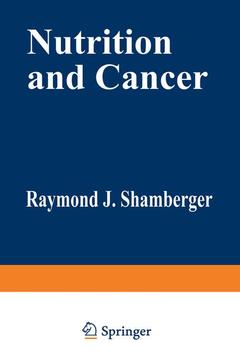Description
Nutrition and Cancer, Softcover reprint of the original 1st ed. 1984
Author: Shamberger Raymond
Language: English
Subject for Nutrition and Cancer:
Approximative price 52.74 €
In Print (Delivery period: 15 days).
Add to cart
Publication date: 04-2012
372 p. · 15.5x23.5 cm · Paperback
372 p. · 15.5x23.5 cm · Paperback
Description
/li>Contents
/li>
The importance of environmental factors in the etiology of the major degener ative diseases, including cancers, is now generaIly accepted. Evidence obtained from studies with experimental animals and from human populations associates nutritional factors and dietary constituents with the causation of cancers at differ ent sites in the body. Estimates by epidemiologists based on comparisons of various population groups have indicated that as much as 50% of the cancer mortality may be influenced by diet. An important indicator is found in migrants to the United States or to other countries who develop the spectrum of cancers typical for the United States (or other countries) but different from that reported for their native country. About 20% of aIl deaths (450,000 per year) in the United States are caused by cancer. In addition, as the population grows the number of cancer cases steadily increases, but the age-adjusted total cancer incidence and mortality rates for sites other than the respiratory tract (cancers primarily attributable to cigarette smoking) have remained stable during the last 30 to 40 years. If one-half of these cancers are associated with dietary practices, an understanding of the process could save about 225,000 lives each year. The causes of cancer have been an important area of cancer research for many years. Certainly if one understands how the diet or the environment affects cancer, great insights might be gained into the mechanisms of cancer as weIl.
1 Scope of the Problem of Nutrition and Cancer.- Environmental Carcinogenesis.- Diet and Lifestyle.- Tobacco.- Tobacco—Alcohol.- Sunlight.- Ionizing Radiation.- Occupation.- Iatrogenic Causes.- Congenital, Hereditary, and Unknown Factors.- Infections.- Reproductive and Sexual Behavior.- Ways in Which Diet Might Affect Cancer.- Ingestion of Powerful Direct-Acting Carcinogens.- Substances Affecting the Formation of Carcinogens in the Body.- Substances Affecting Transport, Activation, or Deactivation of Carcinogens.- Affecting “Promotion” of Cancer Cells.- Overnutrition.- Diet and Future Cancer Trends.- Dietary Goals for the United States.- Mechanisms of Cancer Formation.- Causes of Human Cancer.- Genotoxic Mechanisms.- Epigenetic Mechanisms.- Cancer Trends.- New Cases.- Survival.- References.- 2 Macronutrients and Cancer.- Lipids.- Epidemiological Evidence.- Animal Experiments.- Protein.- Epidemiological Evidence.- Experimental Evidence.- Amino Acids.- Deficiencies.- Effect on Immunity.- Carbohydrate.- Epidemiological Evidence.- Experimental Evidence.- References.- 3 Dietary Fiber and Cancer.- Epidemiological Evidence.- Mechanisms of Protection.- Correlations.- Experimental Evidence.- References.- 4 Vitamins and Cancer.- Vitamin A.- Effects of Vitamin A on Metaplasia and Carcinogenesis in Animals.- Retinoids.- Carotenoids.- Retinol-Binding Protein.- Mechanisms of Action.- Epidemiological Evidence.- Vitamin B.- General Effect in Animals.- Vitamin C.- Anticarcinogenic Effects of Vitamin C.- Effects in Man.- Tumor-Enhancing Effect of Vitamin C.- Antimutagenic Effect of Ascorbic Acid.- Mutagenicity of Ascorbic Acid.- Vitamin D.- Requirements and Effect of a Deficiency.- Effect on Cytosol Receptors.- Vitamin E.- Requirements and Effect of a Deficiency.- Effect on Animal Carcinogenesis.- Effect on Mutagenesis.- Effect on Fibrocystic Breast Disease.- Vitamin K.- Requirements and Effect of a Deficiency.- Effect of Vitamin K Antagonists on Cancer.- Effect of Vitamin K on Mutagenesis.- Effect of Vitamin K on Carcinogenesis.- References.- 5 Minerals and Cancer.- Selenium and Cancer.- Skin Cancer.- Liver Cancer.- Colon Cancer.- Breast Cancer.- Pancreatic Cancer.- Tracheal Cancer.- Effect of Selenium on Preneoplastic Lesions.- Effect of Selenium on Transformation of Cells in Organ Culture.- Effect of Selenium on Benzpyrene-Induced Sarcoma.- Chemotherapeutic Effect of Selenium.- Epidemiological Relationship.- Selenium Blood Levels in Cancer Patients.- Selenium as a Carcinogen.- Selenium and Mutagenesis.- Antimutagenicity.- Mutagenicity.- Selenium and Immunity.- Effect of Selenium on Humoral Immunity.- Cell-Mediated Immunity.- Nonspecific Immune Effects of Selenium.- Zinc.- Epidemiological Evidence.- Experimental Evidence.- Copper.- Epidemiological Studies.- Iron.- Epidemiological Evidence.- Experimental Evidence.- Molybdenum.- Epidemiological Evidence.- Experimental Evidence.- Iodine.- Epidemiological Evidence.- Experimental Evidence.- Manganese.- Levels in Malignant Tissue.- Effect on Carcinogenesis.- Mechanism of Action.- Fluoride.- Magnesium.- Potassium.- Arsenic, Cadmium, and Lead.- Mixtures of Metals.- Asbestos.- Talc.- References.- 6 Mutagens in Food.- Mutagens Resulting from Cooking of Foods.- Mutagens from Pyrolyzed Proteins and Amino Acids.- Mutagens.- Mutagens from Pyrolyzed Amino Acids.- Mutagens from Pyrolyzed Proteins.- Mutagens Formed from Meat at Lower Temperatures.- Mutagen Formation Involving Carbohydrates.- Plant Flavonoids.- Mutagenic Activity on Extracts of Food and Beverages.- Modifiers of Mutagenic Activity.- References.- 7 Naturally Occurring Carcinogens.- Mycotoxins.- Aflatoxins.- Other Mycotoxins.- Sterigmatocystin.- Ochratoxin A.- Zearalenone.- T-2 Toxin.- Patulin.- Penicillic Acid.- Griseofulvin.- Luteoskyrin, Cyclochlorotine: Penicillium islandicum.- Ergot.- Hydrazines.- Epidemiological Evidence.- Experimental Evidence: Agaricus bisporus.- Experimental Evidence: Gyromitra esculenta.- Plant Constituents and Metabolites.- Pyrrolizidine Alkaloids.- Allylic and Propenylic Benzene Derivatives.- Bracken Fern Toxin(s).- Estrogenic Compounds.- Coffee.- Methylxanthines.- Thiourea.- Tannic Acid and Tannins.- Coumarin.- Parasorbic Acid.- Metabolites of Animal Origin.- Tryptophan and Its Metabolites.- Hormones.- Fermentation Product: Ethyl Carbamate.- References.- 8 Additives and Contaminants.- Additives.- Saccharin.- Cyclamate.- Aspartame.- Food Colorings.- Butylated Hydroxytoluene (BHT) and Butylated Hydroxyanisole (BHA).- Indoles.- Aromatic Isothiocyanates.- Flavones.- Protease Inhibitors.- ß-Sitosterol.- Contaminants.- Vinyl Chloride.- Acrylonitrile.- Diethylstilbestrol.- Pesticides.- Polychlorinated Biphenyls.- Polybrominated Biphenyls.- Polycyclic Aromatic Hydrocarbons.- References.- 9 Unproven Cancer Diet Claims.- Laetril.- Chemistry.- Toxicology.- Clinical Trial.- Pangamic Acid.- Unproven Therapies.- Comprehensive Approach.- Pancreatic Enzymes.- Detoxification.- Immune Increase.- Avoidance of Certain Foods.- Analyses of Specific Unorthodox Programs.- Unorthodox Treatment 1.- Unorthodox Treatment 2.- Unorthodox Treatment 3.- Unorthodox Treatment 4.- Unorthodox Treatment 5.- Unorthodox Treatment 6.- Unorthodox Treatment 7.- References.- 10 Cancer Cachexia.- What Is Cancer Cachexia?.- Patient Assessment.- Biochemical Disorders.- Immunological Abnormalities.- Psychological Problems.- Pathogenesis of Cachexia.- Decreased Food Intake.- Excessive Loss of Body Protein.- Malabsorption.- Increased Metabolic Rate.- Abnormal Host Metabolism.- Tumor Products.- Nitrogen Trap by the Tumor.- Anemia.- Management.- Anorexia.- Dietary Supplementation.- Nasogastric Tube Feeding.- Intravenous Hyperalimentation.- Plasmapheresis.- Nutritional Effects of Cancer Treatment.- References.
© 2024 LAVOISIER S.A.S.




